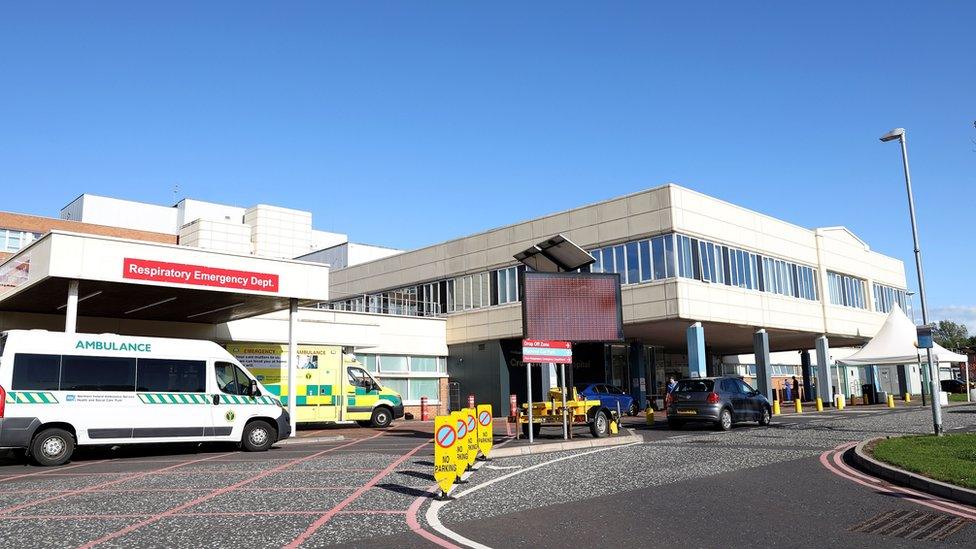Troy Brady: Doctor has 'regrets' over breech baby birth
- Published

Baby Troy Brady died in Craigavon Area Hospital six days after he was born there
One of the doctors at the centre of an inquest into the death of a baby boy who was in a breech position said he has "regrets" over the incident.
Dr Rohit Sharma delivered Troy Brady at Craigavon Hospital in August 2016.
Troy was born in a "state of collapse" and died in the neonatal unit six days later.
Dr Sharma told an inquest he now regretted not "double-checking" the parents understood the risks of the delivery options.
Jane and John Brady told the inquest during their evidence that the first doctor they saw, Dr Lynsey Hinds, who was the doctor in admissions, failed to warn them of the risks of having a vaginal delivery with their baby in a breech position, which means the baby is lying bottom or feet first.
The couple said they would have chosen a Caesarean if they had had all the information.
A pathologist told the court Troy, who was born at 33 weeks, was otherwise a normally developed baby with no evidence of abnormalities.
Troy suffered a severe amount of brain damage due to a lack of blood and oxygen supply.
He had to be resuscitated after birth, which took about 17 minutes, and was then taken to the intensive care unit, the court heard.
Troy was on life support for six days before he died.
Couple 'made aware' of consequences
Giving evidence earlier in the inquest, his parents disputed the accounts from some of the medical professionals involved.
Mrs Brady told the court she was not warned of the potentially serious consequences of a vaginal breech delivery: "If the vaginal birth risks had been discussed, I wouldn't be sitting here fighting for justice for my son."
"I only cared about the safety of my baby, I said I didn't mind going through surgery."
Dr Hinds, who gave evidence on Tuesday, said: "I discussed the two options of vaginal or C-section."
She added the conversation with the couple was "lengthy" and they were "made aware of the potentially serious consequences" of a vaginal birth.
John Brady told the court on Monday he had asked Dr Hinds about the risk of head injury with a vaginal delivery of a baby in the breech position.
He said Dr Hinds told them "no, the baby should come out easily" because Troy would be small at 33 weeks.
Dr Hinds told the court: "I cannot recall him mentioning head injury.
"I believe they had a massive amount of information to take in that day. I believe they were in shock with their baby coming early.
"I don't accept their recollection."
'Like it was yesterday'
Dr Hinds told the inquest she remembered the couple "had no firm views either way" on the delivery choice and the couple agreed to "go for the vaginal".
"Cases like Mrs Brady's don't leave you," she said.
"I recall it like it was yesterday."
Dr Sharma, who delivered baby Troy. also gave evidence and told the inquest he accepted the birth was high risk due to the prematurity of the birth and the breech position.
Dr Sharma said a vaginal delivery and a C-section delivery were "offered" to the couple and he was not alerted to any difficulties in the counselling around delivery options.
"I had no doubt in Dr Hinds experience and skills," he said.
However, Dr Sharma said: "I should have discussed this with the couple. I should have double-checked".
It was also put to Dr Sharma that experts for the coroner agreed "that with a C-section, baby Troy would have survived."
Midwives 'surprised'
Dr Sharma was also asked about his choice to have Mrs Brady deliver in what the inquest called the all-fours position.
This instruction caused some "surprise" in the midwives present, and Dr Sharma agreed they were not comfortable with that delivery position.
Dr Sharma said he was experienced with the mode of delivery, having performed it at least 12 times at other hospitals. However, he acknowledged that for staff at Craigavon Area Hospital it was a new practice.
He said he knew it was the best way, but added: "I should have taken staff in to account."
When asked had he ever performed the specified delivery method in a pre-term pregnancy before, Dr Sharma replied: "Probably not."
A solicitor asked Dr Sharma if that choice of delivery could have caused a delay during the delivery, Dr Sharma said "no".
Dr Sharma said he was "really sorry about what happened on the day".
The inquest continues.
Related topics
- Published8 April 2024
